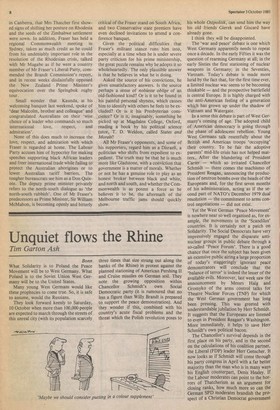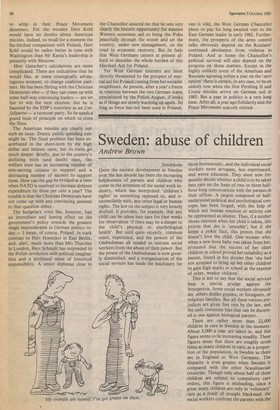Unquiet flows the Rhine
Tim Garton Ash
Bonn What Solidarity is to Poland the Peace Movement will be to West Germany. What Poland is to the Soviet Union West Germany will be to the United States.
Many young West Germans would like these prophecies to come true. So, it is safe to assume, would the Russians.
They look forward keenly to Saturday, 10 October when more than 100,000 people are expected to march through the streets of this unreal city (with its population scarcely three times that size strung out along the banks of the Rhine) in protest against the planned stationing of American Pershing II and Cruise missiles on German soil. They note the growing opposition within Chancellor Schmidt's own Social Democratic party (it is rumoured that no less a figure than Willy Brandt is prepared to support the peace demonstration). And they wonder if this, combined with his country's acute fiscal problems and the threat which the Polish revolution poses to his whole Ostpolitik, can send him the way his old friends Gierek and Giscard have already gone.
I think they will be disappointed.
The 'war and peace' debate is one which West Germany apparently needs to repeat once a decade. In the early Fifties it was the question of rearming Germany at all; in the early Sixties the first stationing of nuclear weapons in Germany; in the Seventies, Vietnam. Today's debate is made more lurid by the fact that, for the first time ever, a limited nuclear wai seems to be becoming thinkable — and the prospective battlefield is central Europe. It is highly charged with the anti-American feeling of a generation which has grown up under the shadow of Vietnam and Watergate.
In a sense this debate is part of West Germany's coming of age. The adopted child of American democracy is going through the phase of adolescent rebellion. Young West Germans talk resentfully about the British and American troops 'occupying' their country. To be fair the adoptive parents' mid-life crisis has not helped matters. After the blundering of President Carter — which so irritated Chancellor Schmidt — there comes the machismo of President Reagan, announcing the production of neutron bombs over the heads of the Europeans and, for the first seven months of his administration, acting as if the second part of NATO's December 1979 dual resolution — the commitment to arms control negotiations — did not exist.
Yet the West German 'Peace Movement' is nowhere near so well organised as, for example, the movements in the `Scandilux' countries. It is certainly not a patch on Solidarity. The Social Democrats have very impressively engaged the disparate antinuclear groups in public debate through a so-called 'Peace Forum'. There is a good chance that once the subject has been given an extensive public airing a large proportion of today's staggeringly ignorant peace demonstrators will conclude that the 'balance of terror' is indeed the lesser of the available evils. Moreover, last week saw the announcement by Messrs Haig and Gromyko of the arms control talks for Theatre Nuclear Forces (TNF) for which the West German government has long been pressing. This was greeted with understandable jubilation by Herr Schmidt. It suggests that the Europeans are listened to even in President Reagan's Washington. More immediately, it helps to save Herr Schmidt's own political bacon.
The Chancellor's survival depends in the first place on his party, and in the second on the calculations of his coalition partner, the Liberal (FDP) leader Herr Genscher. It now looks as if Schmidt will come through his party congress in April with a far better majority than the man who is in many ways his English counterpart, Denis Healey. If the Labour moderates can point to the horrors of Thatcherism as an argument for closing ranks, how much more so can the German SPD moderates brandish the prospect of a Christian Democrat government to whip in their Peace Movement dissenters. For the wooden Herr Kohl would have no doubts about American missiles. Indeed, to recall for a moment the far-fetched comparison with Poland, Herr Kohl would be rather better in tune with Washington than Mr Kania's leadership is presently with Moscow.
Herr Genscher's calculations are more complicated. There are indications that he would like, at some strategically advantageous moment, to change coalition partners. He has been flirting with the Christian Democrats who — if they can come up with some half-way convincing leaders — are set fair to win the next election, but he is haunted by the FDP's notoriety as an Urnfallpartei — a turncoat party. So he needs a grand issue of principle on which to cross the floor.
The American missiles are clearly not such an issue. Drastic public spending cuts might be. The fiscal problem has been exacerbated in the short-term by the high dollar and interest rates, but its roots go much deeper. Briefly, due to the country's declining birth (and death) rates, the welfare state has an increasing number of non-earning citizens to support and a decreasing number of earners to support them. How can the gap be bridged at a time when NATO is resolved to increase defence expenditure by three per cent a year? The trouble is that the Christian Democrats have not come up with any convincing answers to that question either.
The budgetary crisis has, however, had an immediate and laming effect on the government's policy towards the greatest single imponderable in German politics today — I mean, of course, Poland. In stark contrast to Herr Honecker in East Berlin, and, alas!, much more than Mrs Thatcher in London, Herr Schmidt has responded to the Polish revolution with political imagination and a profound sense of historical responsibility. A senior diplomat close to the Chancellor assured me that he sees very clearly the historic opportunity for massive Western economic aid to bring the Poles peacefully through the winter and set the country, under new management, on the road to economic recovery. But he feels that West Germany cannot at present afford to shoulder the whole burden of this Marshall Aid for Poland.
Yet West German interests are most directly threatened by the prospect of martial aid for Poland coming from her socialist neighbours. At present, after a year's freeze in relations between the two German states precipitated by the Polish August, if looks as if things are slowly warming up again. So long as force has not been used in Poland, one is told, the West German Chancellor plans to pay his long awaited visit to the East German leader in early 1982. Furthermore, the prospects of the arms control talks obviously depend on the Russians' continued abstinence from violence in Poland. And at home the Chancellor's political survival will also depend on the progress on those matters. Except in the highly unlikely event of the American and Russians agreeing within a year on the 'zero option' there is certain, in any case, to be an unholy row when the first Pershing II and Cruise missiles arrive on German soil in 1983. But a year in politics is a very long time. After all, a year ago Solidarity and the Peace Movement scarcely existed.







































 Previous page
Previous page